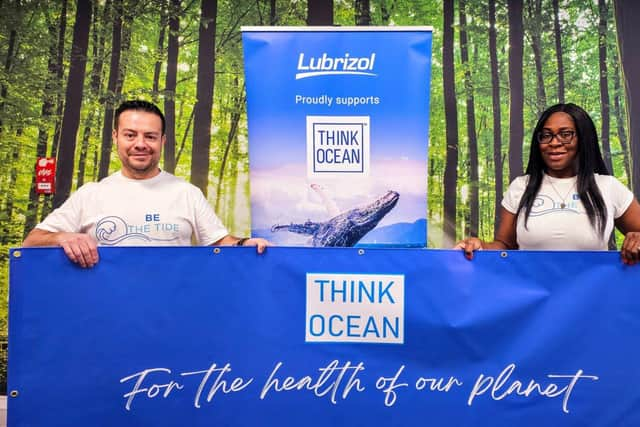Heanor charity boss’s new HQ shows how the fight against sea plastic starts inland
and live on Freeview channel 276
A Heanor man whose charity wants to help rid the world’s oceans of millions of tonnes of plastic has established his UK headquarters in Derby – even though it’s nearly 80 miles away from the nearest seashore.
Hugo Valdes-Vega, founder of environmental charity Think Ocean, has set up shop in an office in the centre of the city as it steps up its efforts to raise awareness of the damage plastics do to marine wildlife and stop the pollution.
Advertisement
Hide AdAdvertisement
Hide AdThe closest seaside town to Derby is Skegness, 77 miles away as the crow flies and 97 miles by car, meaning Think Ocean, which operates in seven countries across the world, could not have picked a more unlikely spot for its British headquarters.


However, it picked Derby because it is close to Hugo’s home and because it fits in with Think Ocean’s message, which is that it is people living inland, not in coastal communities, who are most to blame for the ocean’s plastic pollution.
Around 80% of the world’s ocean plastic originates from rivers and canals running through communities such as Derby, which sits on the banks of the River Derwent, whose waters flow onto the North Sea via the River Trent, the River Ouse and the Humber Estuary.
Hugo founded Think Ocean’s UK branch in 2021 and it currently employs six people across the country. The charity is the latest chapter in Hugo’s lifelong campaign to help save the environment, which started in his native Chile as an activist working to stop whale hunting in the Southern Ocean.
Advertisement
Hide AdAdvertisement
Hide AdHe moved to the UK in 2002, but has never lost his passion for protecting marine wildlife and has switched his attention to ridding the oceans of plastic, which has become a global scourge and is responsible for the deaths of more than one million seabirds and 100,000 marine mammals every year.
At least eight million tons of plastic enter the oceans every year and 75% of waste found on the world’s beaches is made from plastic, just two of a host of frightening statistics which has put the issue to the top of the environmental agenda all over the world.
Hugo, whose new office is in Friar Gate, said: “We work with partner organisations all over the world but we haven’t had a UK headquarters until now and I’m very happy that we have opened our official UK office in Derby.
“I know it sounds unusual to be so far away from the sea, but it is appropriate, because most of the plastic that ends up in the oceans has been discarded as litter and been washed or blown into rivers far inland.
Advertisement
Hide AdAdvertisement
Hide Ad“Sadly, like other rivers, there is a lot of plastic in the Derwent, and once it’s in the ocean it’s a huge problem. There isn’t any ocean in the world that hasn’t been affected by plastic so it’s everyone’s responsibility to play their part.
“We are at the heart of the UK in the place where the Industrial Revolution started. We changed the world many years ago and we will do it again, from Derby.”
Think Ocean is one of a large number of organisations working to tackle the problem and has three objectives – to retrieve plastic from inland waterways, to educate people to dispose of its responsibly and work with partner organisations to recycle and reuse the plastic it recovers.
Last year it was awarded a grant from the European Commission’s Horizon Europe project, a six-year £95.5bn strategy to fund research and innovation projects designed to tackle climate change and meet the UN’s Sustainable Development Goals.
Advertisement
Hide AdAdvertisement
Hide AdThink Ocean is using the money to develop a device which can scoop thousands of tonnes of plastic waste such as bottles and bags from river waters.
Although there are a number of similar devices being developed worldwide, most of them focus on collecting plastic that is close to the surface of the water. While this is a good start, floating plastic only accounts for 15% of river plastic - the majority is on the riverbed.
This is where Think Ocean is concentrating its efforts by developing a state-of-the-art hybrid technology river cleaning system, which is capable of retrieving up to 92% of single-use plastics lying on river beds.
It will produce a prototype this year and will then transport it to Novi Sad in Serbia in June, where it will be put to use to clean plastic from the River Danube, which is the second-longest river in Europe and one of its most polluted.
Advertisement
Hide AdAdvertisement
Hide AdHugo added: “Getting the Horizon project funding was massive for us. Besides the economic benefits, it validated and encouraged us to carry on working on real answers to the problems which the authorities have not been able to find.
“At the same time, Horizon will help us to expand our Think Ocean Education Program. Cleaning our oceans is a job for everybody but we want the next generation to be the first to be taught about it as part of their school curriculum because it’s as important to the planet as history and maths.
“The work we do in the UK will then be spread to the rest of the world. Last year we signed an agreement with the African Leadership Organisation and Africa Projects, which will focus on delivering Think Ocean’s education and circular economy programs to schools belonging to the African Nations members.”
To find out more visit www.thinkocean.earth.